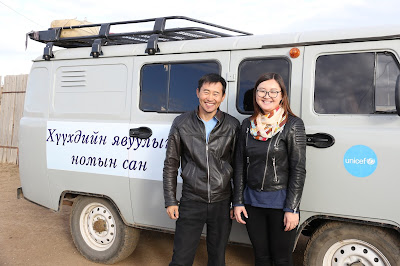 |
Ochiroo with his younger sister outside his home
@UNICEF/2015/Enkhzul Altangerel
|
“This is a dog, and that one is a cat!” says 4-year-old
Ochiroo, turning pages of a children’s book about animals. Ochiroo loves to
read children’s books with his mother. He has learned many new words from the
books, including names of animals and objects in the past few months. Learning
is a special activity for Ochiroo, as he has not been able to attend
kindergarten due to hip dysplasia, which made it very difficult for him to
walk.
Ochiroo lives in a small ger with his mother and two
siblings, in Nalaikh district, an outskirt area of Ulaanbaatar city capital.
His mother Uranzaya stays at home to look after his 1-year-old sister Urangoo.
His father is an army officer who is now in Sudan on a peacekeeping mission.
Born with hip dysplasia, he stays at home most of the time
with almost no interaction with outside world.
 |
Ochiroo reads a book with his mother
@UNICEF/2015/Enkhzul Altangerel
|
“My son started talking quite late compared to other
children. That’s why I was worried that he might have other problems besides
his legs. But when I started reading him books and teaching him new words, his
communication skills have improved significantly in a short period of time” his
mother Uranzaya explains enthusiastically.
The family was introduced to the mobile library project run
by the local Family and Child Development Centre. Uranzaya first rented a book
at the suggestion of a social worker from the center. Without expecting much
she started reading the book to Ochiroo. To her surprise, he liked it so much
that they rented more books. Even Uranzaya took a book for herself to read which
was “Harry Potter and the Chamber of Secrets”.
“We don’t have any books to read at home, so I am very
thankful for mobile library for providing us this opportunity. I think mobile
library is very helpful for children who stay at home. Books help them develop
communication skills” added Uranzaya.
Mobile libraries: More than just books
There are 198 children with disabilities in Nalaikh who have
limited access to basic social services, social and community life. Less than
half of those children attend pre-school or basic education. Most of them stay
at home in the care of their parents or older siblings.
Due to inaccessible roads, walkways, buildings and
facilities, it is very difficult for children with disabilities and their
families to leave their home, to access social services and participate fully
in the community life. The educational, social welfare and health services
provide limited outreach activities to assist these families.
“Reading a book helps children develop their language and
communication skills. That’s whywe
initiated the mobile library project as a new way to reach children and support
their development” says social worker Gantuya from the Child and Family
Development Centre.
 |
Social worker Gantuya (on the right) in front of the mobile
library
@UNICEF/2015/Enkhzul Altangerel
|
The Child and Family Development Centre (CFDC) of Nalaikh district
has analyzed the situation of children with disabilities and initiated number
of initiatives to foster their inclusion
in the community and empower their parents. The mobile library is one of
outreach services that will enable CFDC staff to regularly visit families and
children with disabilities, especially those with limited mobility.
Gantuya added “We made schedules to visit all the families
who have children with disabilities in our district. During scheduled visits,
we conduct trainings for parents on how to read books to their children, as
well as to play with them and other parenting skills. Overall, parents
responded positively to our mobile
library”.
The library does not only provide books, but also toy
renting service for neighborhood children and children with disabilities as
well, meeting the need of children with different abilities.
More needs to be done
There are about 32,000 children with disabilities in
Mongolia. They have the same rights as other children – to an education, health
care, protection and survival. However, they need extra support to achieve
these rights.
“Mobile library is a form of outreach service to the most
vulnerable children, including children with disabilities. During home visits,
social workers encourage parent-child interactions through the use of books and
toys, thus supporting child language and socio-emotional skills. The dialogue
between social workers and parents helps them feel less isolated and promotes
inclusion of children with disabilities in community services” says Mandal
Urtnasan, Community development specialist at UNICEF Mongolia.
Greater commitment to children with disabilities will help
break down barriers and ensure their full inclusion in society. Small
initiatives at community level such as mobile library can ensure that Ochiroo and many other
children like him have the opportunity
to reach their potential and make their contribution to the society.
Author:
Enkhzul Altangerel, Digital Communications Consultant at
UNICEF Mongolia

No comments:
Post a Comment